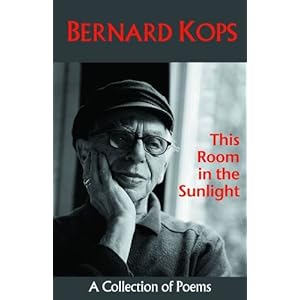Bernard Kops Dancing in the Sunlight
(December 2010)

This Room in the Sunlight
Collected Poems by Bernard Kops
David Paul Publishing, London, 2010, ?9.99p.,
Paperback, 132pp., ISBN 9780954848262
Queen Elizabeth last year rewarded him, at the advice of Gordon Brown, then her prime minister, with a Civil List Pension in recognition of his service to literature. This is a very rare honour that he now shares with Lord Byron and William Wordsworth. Probably the only member of the British poetry-reading public still doggedly unaware that Kops has taken his rightful place among these literary giants is Kops himself.
Kops (b. 1926) is a top British dramatist, his plays performed worldwide for decades. He has written more than 40 plays, nine novels and two autobiographies. He runs a master-class for playwrights. But poetry remains for him, as he put it, the quintessence of everything in literature.
He is extraordinarily prolific. A sense of humour almost never deserts him. Here is how he says he experiences creativity:
Poems are like grandchildren.
You should never bribe or persuade them
to visit you.
and delight you.
Kops is my teacher and my close friend. He is a spellbinding public speaker whose still frequent performances are often remembered in small detail by his audiences for years after such events. He is easily approachable, with informal manners radiating the warmth of a secure early childhood when he was spoilt by the love of his six elder sisters. But his face betrays the suffering endured by him as well as his extended family.
This is how Kops describes her in a train ride:
with long dark hair.
The sun strikes the amber of her dreaming eyes
where I am trapped like a prehistoric fly.
She smiles.
I must get to know her.
She is my wife.
East London as Kops knew it no longer exists. The dockside Jewish communities once sheltering there from the Holocaust have moved on to the prosperous North-West London suburbs of Golders Green and Hampstead. Their place has been taken by more recent immigrant communities from South Asia, introducing to it their very differently exuberant culture. But East London has not forgotten Kops.
The collection opens with the poem Whitechapel Library, Aldgate East paying homage to that institution, once known as the university of the poor, that the poet used to attend as an ill-clad, hungry child feasting on literature. Today, lines of that poem grace the walls of the library, which now serves a splendid modern museum.
Kops is a well known figure of the community. He stages plays there and holds poetry readings, lectures and theatrical workshops. The local press reports on his views and activities. Many residents warmly recognize him on streets and in restaurants.
Kops left school at 13 during the Blitz. He tried acting and the second-hand book trade, drifted through the bohemian world of Soho and won sudden, unexpected fame with his East End play The Hamlet of Stepney Green (1957).
To comment on this review, please click here.
here.
here.